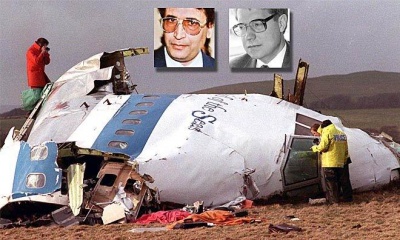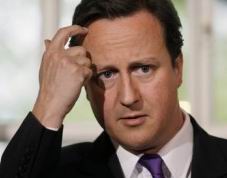Muammar Gaddafi
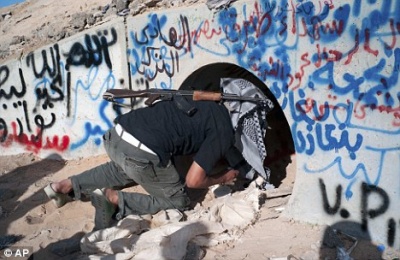
Colonel Muammar Gaddafi (7 June 1942—20 October 2011) was born in the town of Sirte, Libya into a peasant Bedouin family. Colonel Gaddafi was just 27 years old when in 1969 he became leader of the Great Socialist People's Libyan Arab Jamahiriya, following a bloodless coup in which King Idris I was deposed. Gaddafi proceeded to rule Libya for 42 years making him the longest serving ruler in the Arab world and in Africa.
The Libyan Arab Jamahiriya was in theory a "state of the masses," governed by the people through a system of local councils. In practice, though, it was a military dictatorship controlled by Gaddafi. His Green Book was "an attempt to explain the dialectic which exists between Marxism and Capitalism" and in it Gaddafi proposed his "Third Universal Theory" - claiming that there is a third way, beyond communism and capitalism, through which social harmony could be achieved. His ideas were allegedly based around democracy, equality, and communion with nature. However, Colonel Gaddafi supported terrorist organisations including the IRA in Ireland, and the Spanish Basque separatist movement ETA. He had also shown strong support - both moral and financial - for the African National Congress (ANC) and its leader Nelson Mandela.[1]
In the early 1980s, Gaddafi was interviewed by Jana Wendt of Australian TV's 60 Minutes series about Israel's invasion of Lebanon.[2] In 1984, following the murder of policewoman Yvonne Fletcher outside the Libyan Embassy in London, diplomatic relations between Britain and Libya were broken. Two years later, President Ronald Reagan ordered the bombing of targets in Tripoli and Benghazi having accused Libya of responsibility for bombing "La Belle Discotheque" in Berlin in which a number of off-duty American servicemen were killed.
Two Libyans were accused of carrying out the Lockerbie bombing on 21 December 1988, and United Nations sanctions were imposed on Libya as a result. The UN sanctions were removed after one of the two accused, Abdelbaset al-Megrahi, was convicted for the Lockerbie bombing in 2001, and Libya agreed to pay $2.7 billion compensation to the families of the 270 Lockerbie victims. In 2011, UN sanctions were reimposed when a UN Security Council Resolution was passed, authorising NATO to bomb Libya in support of Libyan rebels who wanted to depose Gaddafi.
In September 2013, the Daily Telegraph reported in an article entitled "Secret MI6 plot to help Colonel Gaddafi escape Libya revealed" that - during the 2011 NATO bombing campaign in Libya - Andrew Mitchell, then Britain's International Development Secretary, was dispatched to build covert contacts with the controversial regime in Equatorial Guinea. The Cabinet Office and MI6 had "prepared an exit strategy for Gaddafi in case it was necessary to strike a deal and to end the conflict," and Equatorial Guinea, "oil-rich but awesomely corrupt", was selected for Colonel Gaddafi "as a prospective retirement home." Although Britain has no bilateral links with Equatorial Guinea, contributing only small amounts in aid, Mr Mitchell "was able to assist the officials tasked with these delicate contingency plans, helping make the necessary contacts in the capital, Malabo, and elsewhere."
Ultimately, Colonel Gaddafi was killed by rebels as he tried to flee Sirte on 20 October 2011. It was believed that he was heading for the border of Niger at the time of his death. His 50-car convoy was attacked by Nato airplanes before rebels attacked on the ground. Colonel Gaddafi was tortured before he was killed.[3] It has previously been reported that Colonel Gaddafi was being escorted by a group of South African mercenaries when he came under attack. One of the South Africans subsequently claimed that they believed the escape attempt was operating with tacit support from Western countries. However, the group drove into an ambush with sustained air strikes from French warplanes and ground attacks from rebel fighters.
Equatorial Guinea gained notoriety after an unsuccessful coup attempt in 2004, led by the old Etonian Simon Mann and involving Margaret Thatcher's son Mark Thatcher. The "Wonga Coup" failed after a group of mercenaries were arrested in Zimbabwe shortly before launching an attack.
Although the ICC had issued an arrest warrant for Colonel Gaddafi, Equatorial Guinea’s refusal to recognise the court’s authority would have kept Colonel Gaddafi outside its reach. It is believed that some of the mercenaries involved in the Equatorial Guinea coup were also involved in the attempt to extract Gaddafi.[4][5]
Contents
Lockerbie bombing
For many years, Colonel Gaddafi harboured the two Libyans alleged to have been responsible for the bombing of Pan Am Flight 103 over Lockerbie in Scotland, refusing to extradite them or accept responsibility and pay compensation for the Lockerbie bombing. For most of the 1990s, Libya endured economic sanctions and diplomatic isolation as a result of Gaddafi's refusal to allow the extradition of the two accused.
In August 2003, two years after Abdelbaset Ali Mohmed Al Megrahi's conviction in a Scottish court at a former US Air Force base at Camp Zeist in the Netherlands, Libya wrote to the United Nations formally accepting 'responsibility for the actions of its officials' in respect of the Lockerbie bombing and agreed to pay compensation of up to $2.7 billion to the families of the 270 victims. The same month, Britain and Bulgaria co-sponsored a UN resolution which removed the sanctions.
Following the overthrow of Saddam Hussein in 2003, Gaddafi announced that his nation had an active weapons of mass destruction programme, but that he was willing to allow international inspectors into his country to observe and dismantle them. As a result, the United States announced that it would restore full diplomatic relations with Libya once Gaddafi declared he was abandoning Libya's WMD programme.
In March 2004, British Prime Minister Tony Blair became one of the first western leaders in decades to visit Libya and publicly meet Gaddafi. The visit paved the way for greater cooperation between Libya and the UK as the countries pursued trade deals, and also helped to legitimise Gaddafi's rehabilitation in the West. The tour was followed by that of French president Nicolas Sarkozy in July 2007, who went to Libya and signed a number of bilateral and multilateral EU agreements. The changing tide also allowed Gaddafi to host US Secretary of State Condoleezza Rice in September 2008. Next came a historic cooperation treaty between Libya and Italy, which was signed in Benghazi by Gaddafi and Italian Prime Minister Silvio Berlusconi.
United Nations speech
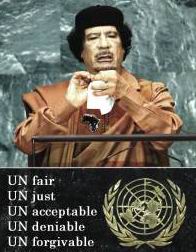
On 23 September 2009, Colonel Muammar Gaddafi famously addressed the United Nations General Assembly (UNGA). In the course of his rambling 96-minute speech, Colonel Gaddafi demanded that the Libyan President of UNGA, Dr Ali Treki, should set in train a number of UN inquiries into:
- the Korean war;
- the Suez invasion;
- the Vietnam war;
- the Iraq invasion;
- the Afghan invasion;
- the assassination of Congolese Prime Minister Patrice Lumumba;
- the assassination of UN Secretary-General Dag Hammarskjöld;
- the assassination of President John F Kennedy; and,
- the assassination of Martin Luther King.[6]
Surprisingly, though, Colonel Gaddafi failed to demand a UN inquiry into the assassination of UN Commissioner for Namibia, Bernt Carlsson, the highest profile victim of the 1988 Lockerbie bombing. Gaddafi did however make a point of attacking the UN Security Council (UNSC), calling it the "UN Terror Council". Within two years of that UNGA speech, the UNSC struck back and deposed Gaddafi after 42 years in power in Libya.[7]
Conspiracy by Reagan and Thatcher
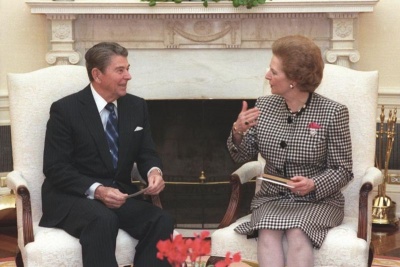
On 2 December 2010, in a video conference link to staff and students at the London School of Economics, Colonel Gaddafi alleged that the case against Abdelbaset Ali Mohmed Al Megrahi had 'been fabricated and created by' Britain's former Prime Minister Margaret Thatcher and former US President Ronald Reagan. He suggested that US CIA officials had been behind the 21 December 1988 Lockerbie bombing in which 270 people were killed.
- "These are the people who created this conspiracy" said Gaddafi, referring to the alleged role of Thatcher and Reagan in Megrahi's conviction and life sentence over the attack on Pan Am Flight 103. "The charges directed towards Libya were based on unfounded evidence in an attempt to weaken the Libyan Revolution and limit its resources and abilities".[8]
In making his allegation, Gaddafi did not include ex-President (and former CIA Director) George H W Bush in this conspiracy. This may suggest that if Thatcher and Reagan had indeed 'fabricated and created' the Lockerbie bombing case against Libya, they would have done so in the interregnum between the 8 November 1988 US presidential election and President Bush taking over from Reagan on 20 January 1989.
Gaddafi's alleged Lockerbie conspiracy could well have been hatched on 15 November 1988 when President Reagan and Prime Minister Thatcher were photographed in the White House library and would undoubtedly have discussed Iran's threat to retaliate massively for the shooting down of Iran Air Flight 655 by USS Vincennes on 3 July 1988 with the loss of 290 civilian lives. The two leaders might then have decided to open secret negotiations with Iran and seek to limit the revenge attack to just one US aircraft. The US and UK would not have wanted to antagonise the Iranians further by blaming Iran for the retaliation, so would have selected 'mad dog' Gaddafi to be their whipping boy.
Western Intelligence Agencies (including apartheid South Africa's National Intelligence Service) would have been party to such negotiations and would have had a say in selecting the sacrificial aircraft. Thus on 22 December 1988 (the day after the Lockerbie bombing), President Reagan phoned Downing Street:[9]
- "Margaret, I understand you have just returned from the site of the Pan Am crash. I want to thank you for your expression of sorrow on the Pan Am 103 tragedy. On behalf of the American people, I also want to thank the rescue workers who responded so quickly and courageously. Our thoughts and prayers are with the victims of this accident, both the passengers on the plane and the villagers in Scotland".
On 28 December 1988, seven days after the Lockerbie bombing, when there was as yet no evidence ostensibly pointing to Libyan culpability, Ronald Reagan in one of the last acts of his Presidency, extended sanctions against Libya and threatened renewed bombing raids.[10]
Sure enough, the joint US/UK investigation into the bombing soon found 'evidence' pointing towards Libya for the sabotage of Pan Am Flight 103. According to author and journalist, Ian Ferguson, it was a case of 'reverse engineering' whereby Libya had been fitted up for the crime and the inculpatory evidence followed (see the 2009 documentary film Lockerbie Revisited).[11]
UNSC authorised NATO bombing
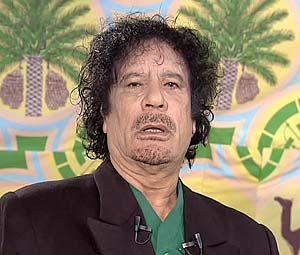
Unwilling to be forced out of office like Egypt's Hosni Mubarak and Tunisia's Zine El Abidine Ben Ali, Colonel Gaddafi allegedly ordered a violent crackdown after political protests began in Libya in February 2011. The Gaddafi regime lost control of the east of the country and responded by threatening military force against the rebels.
By March 2011 the UN Security Council had declared a no fly zone over the country, with NATO forces bombing military targets on the pretext of protecting civilians from Gaddafi's forces. On 5 April 2011, in an interview on BBC Radio 4's Today Programme, Colonel Gaddafi's son Saif al-Islam said:[12]
"The British and the Americans they know about Lockerbie. They know everything about Lockerbie. So there's no secret anymore about Lockerbie."
In June 2011, the International Criminal Court issued an arrest warrant against Gaddafi, his son Saif al-Islam and intelligence chief al-Senussi for alleged crimes against humanity.[13] In August 2011, the NATO bombing of Libya intensified, with the rebel forces gaining control of the capital Tripoli. Gaddafi's compound was taken over and one of his sons detained by rebels. News footage showed rebels entering the city's main square and tearing down pictures of Gaddafi.
SA mercenaries "betrayed Gaddafi"
According to a South African News24 report published on 30 October 2011, Colonel Gaddafi sought help from the private security industry to get him out of his hometown of Sirte, where he was under siege by NATO and rebel forces, and "bring him to South Africa". The recruitment of South African mercenaries was done by Sarah Penfold, a well-known name in the industry based in Kenya, who apparently acted on behalf of a company in London. The SA mercenaries were led to believe that they would be rescuing Gaddafi and taking him to "live in a tent in the Karoo", but they actually helped him from the frying pan into the fire.
Speaking to one of the South African operators who was at Gaddafi’s side and a senior source in the intelligence world, City Press discovered the mercenaries were probably also misled into thinking they were helping Gaddafi. Their involvement was really only part of a larger plan to capture Gaddafi, it now appears. South Africa's State Security Agency is aware of Sarah Penfold's visit to Johannesburg on 17 August 2011, and she is being investigated.[14]
Gaddafi's demands
Muammar Gaddafi himself apparently requested assistance from the private security industry. Subsequently, negotiations were held in which he allegedly made demands concerning his planned stay in South Africa. One of the operators, Danie Odendaal, told City Press that in his correspondence Gaddafi insisted he be accommodated in a tent in a hot region – preferably desert-like. He said they speculated that the only suitable place in South Africa would be the Karoo.
After being issued with false passports, three groups of South Africans flew to Dubai and Cairo, from where they hurriedly flew to Libya to assist Gaddafi. But things turned into a "disgusting, disgusting orgy" when Nato forces fired on Gaddafi’s convoy before transitional government soldiers captured and executed him on 20 October 2011.[15]
Abortive project
Afterwards, the details and the incredible "coincidence" of the abortive project started unfolding. City Press has discovered there was no request to the South African authorities to bring Gaddafi, a fugitive from the International Criminal Court, here. It would never have been allowed, a reliable government source said. Intelligence sources believe there were agents among the mercenaries, or in some of the security companies, who were spying for the transitional government and reporting on the mercenaries’ movements. Nato launched its attack on Gaddafi with deadly precision, and Odendaal believes someone "sold them out". There is another group of South Africans in Libya, but City Press has learned they are not under arrest. They come and go as they like, and some live in hotels.
No-one wants to comment
Former South African Police Commissioner George Fivaz said he received a call from a man in London last week who wanted to hire a 50-seat air ambulance to fetch people in Libya. Fivaz told him he couldn’t help him. City Press telephoned a security company in London for comment about allegations they had contracted the South Africans through Penfold. Initially, an employee immediately ended the call. Another employee, who only identified himself as "Harry", at first said they didn’t have any operations in Libya. Later he said "no-one will comment about this". Despite many telephone calls, Sarah Penfold couldn’t be reached for comment. The South African government doesn’t want to become involved, and it's not clear how the mercenaries will be taken out of Libya.
State Security Agency spokesperson Brian Dube said they didn’t wish to comment at this stage.
Retraction
On 30 October 2011, City Press published a report entitled "SA Mercenaries were misled". The report referred to allegations that the London based Hart Security had contracted South African mercenaries through an intermediary to render certain services in Libya. The reference to Hart Security in the report was published in error. City Press regrets the error and retracts the allegation.[16]
Cameron's Lockerbie secret
Prime Minister David Cameron has a secret about Lockerbie. It’s a secret that explains why the PM was desperate to have Colonel Gaddafi blamed personally for the sabotage of Pan Am Flight 103 on 21 December 1988, and to have Gaddafi executed without a trial.
Three months after the Lockerbie bombing, the then Prime Minister Margaret Thatcher and the rising star in Conservative Research Department, David Cameron, visited apartheid South Africa.[17]
The past and future British Prime Ministers made a point of visiting the Rössing Uranium Mine in Namibia (illegally occupied by apartheid South Africa in defiance of UN Security Council Resolution 435). In 1989, the Rössing mine was jointly owned by Rio Tinto Group and the Iranian Government, and was supplying uranium to develop Iran’s nuclear programme. Mrs Thatcher was so impressed with the Rössing Uranium Mine that she declared it made her "proud to be British", a sentiment echoed by Mr Cameron.[18]
It has recently been reported that Margaret Thatcher and David Cameron concluded a secret nuclear deal with the apartheid regime during their visit in 1989.[19]
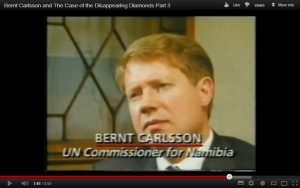
On 21 December 1988, Assistant Secretary-General of the United Nations and UN Commissioner for Namibia, Bernt Carlsson, was the most prominent of the 270 victims of the Lockerbie bombing. In the months leading up to his death, Carlsson had warned that he would start proceedings against the countries and firms which had been defying UN law over many years by stealing billions of pounds-worth of Namibia's natural resources. Among those facing huge UN compensation claims were Rio Tinto Group, the government of Iran, the diamond mining giant De Beers and the apartheid regime. Because the UN Commissioner for Namibia was killed at Lockerbie, none of those prosecutions ever took place.[20]
The latest evidence suggests that Iran and apartheid South Africa targeted UN Commissioner for Namibia, Bernt Carlsson, on Pan Am Flight 103 and that Libya was not responsible for the Lockerbie bombing.[21]
Which explains why Prime Minister David Cameron was desperate to have Colonel Gaddafi blamed personally for the sabotage of Pan Am Flight 103 on 21 December 1988, and to have Gaddafi executed without a trial at the International Criminal Court.[22]
Gaddafi should not have been killed
Published the day after Gaddafi's murder, Christopher Hitchens (1949-2011) a columnist for Vanity Fair and the author, most recently, of "Arguably", a collection of essays, wrote:
- Surrendering to a feeling of deep impotence and slight absurdity, I borrowed an iPad on Thursday afternoon and used it to send my first-ever message by this means. It was addressed to one of those distinguished Frenchmen who have been at the fore in pressing the outside world to remove Muammar Gaddafi from the obscene toadlike posture in which, for more than four decades, he has squatted on the lives of the Libyan people. Please, I wrote, intercede with your friends on the National Transitional Council, plus any other revolutionary tribunal however constituted, in order to stop the killing of the Gaddafi family and to ensure smooth passage to the dock at The Hague for those who have already been indicted for crimes against humanity.
- Simple enough? It is some time since the International Criminal Court in The Hague has announced itself ready and open for business in the matter of Libya. But now Muammar Gaddafi is dead, as reportedly is one of his sons, Mutassim, and not a word has been heard about the legality or propriety of the business. No Libyan spokesman even alluded to the court in their announcements of the dictator’s ugly demise. The president of the United States spoke as if the option of an arraignment had never even come up. In this, he was seconded by his secretary of state, who was fresh from a visit to Libya but confined herself to various breezy remarks, one of them to the effect that it would aid the transition if Gaddafi was to be killed. British Prime Minister David Cameron, who did find time to mention the international victims of Gaddafi’s years of terror, likewise omitted to mention the option of a trial.
- Among other things, this tacit agreement persuades me that no general instruction was ever issued to the forces closing in on Gaddafi in his hometown of Sirte. Nothing to the effect of: Kill him if you absolutely must, but try and put him under arrest and have him (and others named, whether family or otherwise) transferred to the Netherlands. At any rate, it seems certain that even if any such order was promulgated, it was not very forcefully.
- At the close of an obscene regime, especially one that has shown it would rather destroy society and the state than surrender power, it is natural for people to hope for something like an exorcism. It is satisfying to see the cadaver of the monster and be sure that he can’t come back. It is also reassuring to know that there is no hateful figurehead on whom some kind of "werewolf" resistance could converge in order to prolong the misery and atrocity. But Gaddafi at the time of his death was wounded and out of action and at the head of a small group of terrified riff-raff. He was unable to offer any further resistance. And all the positive results that I cited above could have been achieved by the simple expedient of taking him first to a hospital, then to a jail, and thence to the airport. Indeed, a spell in the dock would probably hugely enhance the positive impact, since those poor lost souls who still put their trust in the man could scarcely have their illusions survive the exposure to even a few hours of the madman’s gibberings in court.
- And so the new Libya begins, but it begins with a squalid lynching. News correspondents have been quite warm and vocal lately, about the general forbearance shown by the rebels to the persons and property of the Gaddafi loyalists. That makes it even more regrettable that the principle could not be honored in its main instance. At the time of writing, Saif al-Islam Gaddafi, one of Muammar’s sons, is said to be still at large. It will be quite a disgrace if he is also killed out of hand, or if at the very least the NTC and the international community do not remind their fighters that he needs to be taken into lawful custody.
- This is not to display any undue sympathy for Saif, or others on the wanted list. But he in particular is the repository of an enormous amount of potentially useful information, about the nature of the dead regime and perhaps even of the whereabouts of strategic material—to say nothing of vast illegal holdings of money that are the rightful property of the Libyan people. In more senses than one, it would be a crime to be party to this destruction of evidence. As for the usefulness of Gaddafi senior in the still-underdeveloped field of the study of megalomania, I should have said it was beyond price. And yet his numberless victims have to take such satisfaction as they can from seeing a blood-streaked and incoherent figure, handled roughly and in a panic and then put out of his misery by a shot that added exactly nothing to the security of the country.
- I was in Romania on the day that Nicolae and Elena Ceausescu were hastily done away with, and I was in Mosul on the day before Uday and Qusay Hussein were surrounded and submitted to lethal shot and shell in a house from which there was no escape. In both cases, the relief felt by the general population was palpable. There can be no doubt that the proven elimination of the old symbols of torture and fear has an emancipating effect, at least in the short term. But I would say that this effect is subject to rapidly diminishing returns, which became evident in Iraq when Moqtada al-Sadr’s unpolished acolytes got the job of conducting the execution of Saddam Hussein. There are sectarian scars still remaining from that botched and sordid episode, and I shall be very surprised if similar resentments were not created among many Libyans on Thursday. Too late to repair that now. But it will be a shame if the killing of the Gaddafis continues and an insult if the summons to The Hague continues to be ignored.[23]
Gaddafi 'did not kill protesters'
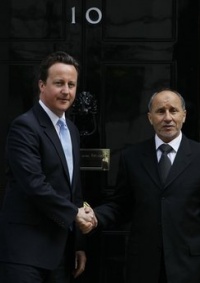
In May 2014, BSNews reported under the headline "Head of False Libyan Revolution Admits Gaddafi did not Kill Protesters" that Mustafa Abdul Jalil, Head of the National Transitional Council in Benghazi in 2011, had admitted:
- Gaddafi did not order the shooting that started the false revolution in Libya. Now after the destruction of Libya, Jalil admits to the world on Libyan Channel One that the protesters that were killed in Benghazi that caused the UN and NATO to attack Libya were killed by a group of spies and mercenaries who were not Libyan. He admits that he knew the truth at the time but it was done to take down the Libyan government and break the state. He admits that he was briefed in advance that this was going to happen and that the people of Libya did not recognise the dead protesters because they wore civilian clothes and there was no one who came to their funerals as they had no relatives or friends in Libya.
As we have been saying since February 2011, the so called revolution in Libya was a false flag. The Libyan people by large majority were happy and "safe". Islamic extremist groups were illegal in Libya. Now Libya is controlled by Islamic extremists groups (Al Qaeda, Libyan Islamic Fighting Group (LIFG), The Muslim Brotherhood, Ansar Al Sharia and others). The country is broken, there is no security, thousands have been imprisoned illegally and hundreds tortured to death. There is no government, there are no oil sales, 2 million are still in exile, psychopaths have taken the country and it is now considered a "grey state" – no borders and no government.
So, thank you Barack Obama, CIA, David Cameron, NATO and the UN for NOT protecting the innocent civilians in Libya.[24]
See also
- Lockerbie Official Narrative
- Cameron's Report on Lockerbie Forensic Evidence
- The Framing of al-Megrahi
- The How, Why and Who of Pan Am Flight 103
- The Case of the Disappearing Diamonds
External links
- "A Medal of Good Hope: Mandela, Gaddafi and the Lockerbie Negotiations"
- "Destroying Libya and World Order: The Three-Decade U.S. Campaign to Terminate the Qaddafi Revolution"
- "Lockerbie: CIA 'fitted up' Gaddafi at the UN Security Council"
- "Lockerbie: CIA made State Department attorney 'lie' to UN Security Council"
- "Lockerbie: Pik 'n' Miss"
References
- ↑ "Colonel Gaddafi Biography"
- ↑ "Muammar Gaddafi interviewed on Australian TV"
- ↑ "What's happening in Libya and who was Colonel Gaddafi?"
- ↑ "Secret MI6 plot to help Col Gaddafi escape Libya revealed"
- ↑ "In It Together: The Inside Story of the Coalition Government"
- ↑ "Colonel Gaddafi's speech to the UN General Assembly"
- ↑ "CIA Planned Gaddafi's Overthrow Thirty Years Ago"
- ↑ "Lockerbie bomber's family preparing to sue Britain for false imprisonment"
- ↑ "Reagan phone call to Thatcher at Downing Street"
- ↑ "Exploding Lockerbie – Part 2"
- ↑ "Lockerbie conspiracy by Thatcher and Reagan"
- ↑ "BBC Radio interview with Saif al-Islam"
- ↑ "The Prosecutor v. Saif Al-Islam Gaddafi and Abdullah Al-Senussi (case against Muammar Gaddafi terminated on 22 November 2011, following his death)"
- ↑ "Mystery of British woman linked to Gaddafi's doomed getaway as it emerges son Saif 'is hiding in Sahara'"
- ↑ "Muammar Gaddafi: How he died"
- ↑ "SA Mercenaries were misled"
- ↑ "Cameron's freebie to apartheid South Africa"
- ↑ "Rössing Uranium Mine"
- ↑ "How the US and UK 'lost' three nuclear weapons"
- ↑ "Bernt Carlsson and the Case of the Disappearing Diamonds"
- ↑ "Lockerbie: Ayatollah’s Vengeance Exacted by Botha’s Regime"
- ↑ "David Cameron's Libyan war: why the PM felt Gaddafi had to be stopped"
- ↑ "The New Libya’s First Mistake" By Christopher Hitchens
- ↑ "Head of False Libyan Revolution Admits Gaddafi did not Kill Protesters"

